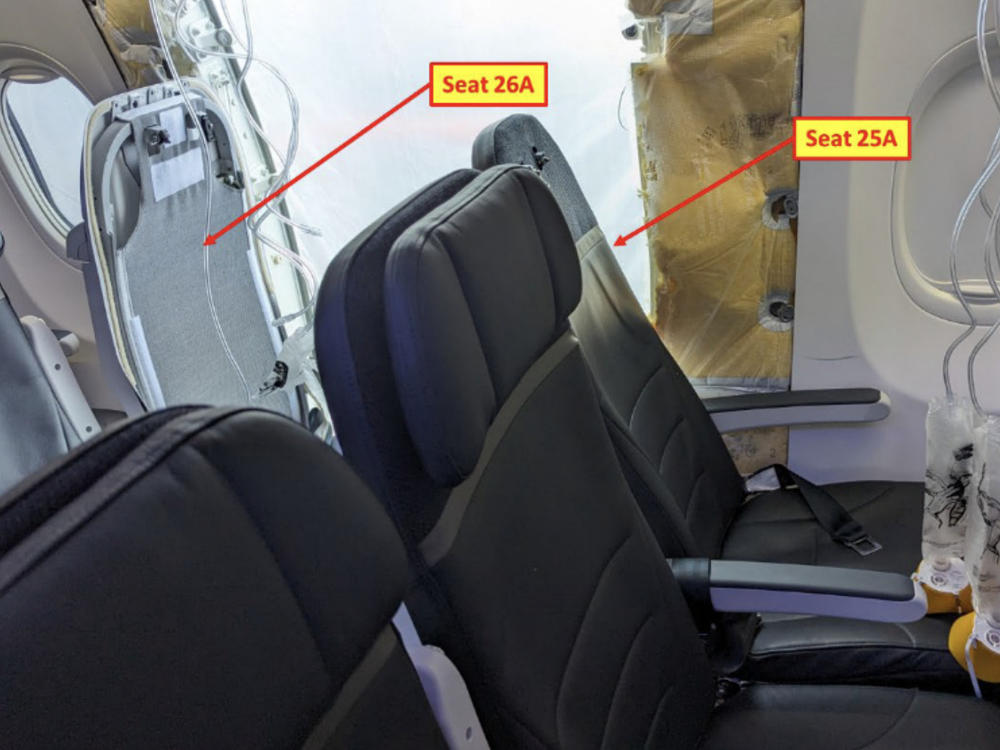Section Branding
Header Content
FBI letter tells Alaska Airlines passengers they are 'a possible victim of a crime'
Primary Content
People who were aboard a Boeing 737 Max 9 jet whose door plug was explosively expelled after departing an airport in Portland, Ore., in January are being contacted by the FBI about a criminal investigation.
"I'm contacting you because we have identified you as a possible victim of a crime," the letter from a victim specialist with the FBI's Seattle Division begins.
The message, a copy of which was shared with NPR by Mark Lindquist, an attorney representing passengers, lists an investigative case number and tells the passengers they should contact the FBI through an email address set up specifically for people who were on the flight.
"We are pleased the DOJ is investigating," Lindquist said. "We want answers, accountability, and safer planes. Pressure from the DOJ should help."
Lindquist, who represents 27 of the 171 passengers on the Boeing airliner, says his clients will speak to federal investigators if they're asked.
When asked about the investigation and the letters to potential victims on Friday, a spokesperson for the FBI's office in Seattle told NPR, "Per DOJ policy, the FBI does not confirm or deny the existence of an investigation." A Boeing representative said the company also declines to comment.
News emerged earlier this month that the Department of Justice was opening a criminal investigation into Alaska Airlines Flight 1282, which took off from Portland, Ore., shortly after 5 p.m. PST on Jan. 5, bound for Ontario, Calif.
The plane climbed above 16,000 feet, but a rapid decompression from losing the large panel terrified passengers and sucked phones and other items out of the gaping hole in the fuselage. The flight returned to the airport and made an emergency landing almost exactly 20 minutes after it took off.
At least two groups of passengers have filed lawsuits against Boeing and Alaska Airlines alleging negligence and other failures. Plaintiffs in one lawsuit include Huy Tran, who was seated one row behind the door plug.
"It's not like when somebody bumps your car on the freeway," Huy recently told Portland TV station KPTV. "It's like you almost died and the feelings that come with that."
The National Transportation Safety Board's preliminary report found that four important bolts were missing from the Boeing plane — bolts that were meant to prevent the door plug from sliding upward, the agency said.
The debacle is the latest black eye for Boeing, whose reputation was already tarnished by deadly crashes of its 737 Max 8 jets in 2018 and 2019. The Max 8 version of the 737 is around 9 feet shorter than the Max 9.
The door plug failure has put new scrutiny on the deal Boeing reached with the Justice Department to settle a criminal charge related to those crashes, which killed 346 people. The deal angered many families who lost loved ones in the crashes, who said it was too lenient and failed to hold the company and its employees accountable.
Boeing had been accused of engaging in a criminal conspiracy to defraud the Federal Aviation Administration, as the regulator evaluated its 737 MAX airplane.
"Federal prosecutors say key Boeing employees 'deceived the FAA,' misleading the safety regulators about a new flight control system on the 737 Max called MCAS," as NPR reported in January of 2021.
The deferred prosecution agreement had been set to expire three years after it was filed on Jan. 7, 2021. But the agreement also allows the DOJ's Fraud Section to extend its heightened scrutiny for up to an additional year if Boeing is found to have failed to fulfill its obligations — including the airplane company's promise to strengthen its compliance and reporting programs.
While the deal was set to expire on Jan. 7 of this year, that doesn't mean the charges would be automatically dismissed on that date.
"Six months after the Agreement's expiration," the agreement states, "the Fraud Section shall seek dismissal with prejudice of the Information filed against the Company ... and agree not to file charges in the future against the Company based on the conduct" related to the prosecutors' allegations.

